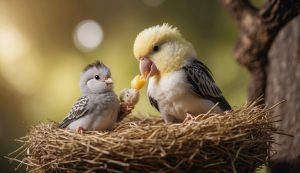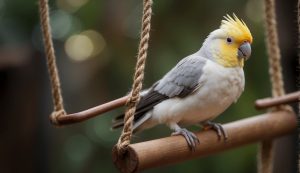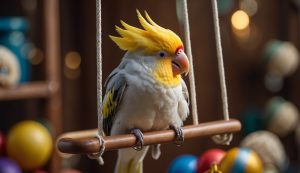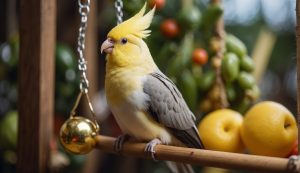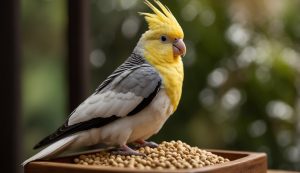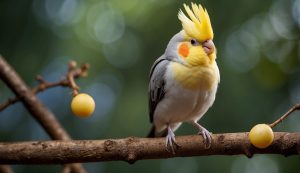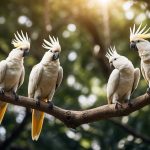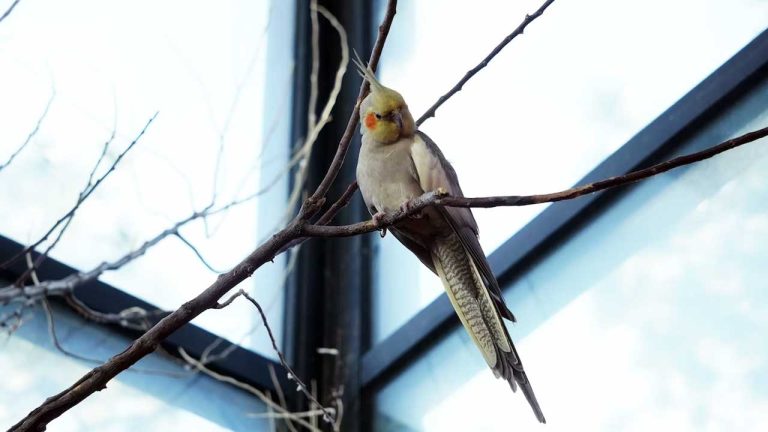How Much Food Do Cockatiels Need? – Portion Sizes for a Healthy Diet

Determining the right amount of food for a cockatiel involves an understanding of their dietary needs and the types of food that contribute to a healthy diet.
As a pet owner, I am always careful to ensure that my feathered friend maintains a balanced diet that mirrors their natural inclination for variety.
Cockatiels, in their natural habitat, feed on a range of seeds, fruits, and greenery; in captivity, it’s essential to replicate this to the best of our abilities.
It is not just about the quantity of the food but the quality and diversity that ensure my cockatiel stays healthy and happy.

Observing my cockatiel’s eating habits has taught me that their dietary preferences can change as they age.
Young cockatiels often have a predilection for certain seeds like millet and oats, while adults might show a preference for formulated pellets.
But, no matter their age, it’s my responsibility to provide a well-rounded diet that includes seeds, pellets, fresh fruits, and vegetables.
I must also be conscious of the specific food items to avoid, as some can be harmful to my pet.
Constantly educating myself on cockatiel care and appropriate feeding practices is integral to prevent nutritional deficiencies and to promote my bird’s overall wellbeing.
Key Points
- A proper cockatiel diet includes a variety of seeds, pellets, fruits, and vegetables.
- Young cockatiels have different food preferences compared to adult cockatiels.
- It is crucial to know which foods to avoid to keep a cockatiel healthy.
Table of Contents
What Are My Cockatiels’ Dietary Needs?
In caring for my cockatiels, I’ve learned that ensuring they receive a nutritionally balanced diet is crucial for maintaining their health. The right diet can influence their lifespan, vitality, and behavior.
Importance of a Balanced Diet
I aim to provide my cockatiels with a variety of foods to mimic the diverse diet they would naturally have in the wild. This means combining seeds, pellets, vegetables, and fruits.
A balanced diet helps prevent deficiencies and supports overall health.
Nutritional Requirements
My cockatiels’ diet plan includes essential nutrients to keep them thriving:
- Proteins: Vital for growth and repair, found in pellets and legumes.
- Vitamins: Particularly Vitamin A, necessary for their vision and immune system, available in dark leafy greens.
- Minerals: Like calcium for strong bones, found in cuttlebone and broccoli.
- Fats: Needed in moderation for energy, present in seeds and nuts.
- Carbohydrates: Provide energy and are found in grains and some vegetables.
Each component plays a role in creating a healthy cockatiel.
Frequency and Quantity of Feedings
I’ve learned that my cockatiels typically need:
- 2-4 tablespoons of a fortified seed or pellet mix daily.
- Fresh water, always available and replenished daily.
I also provide fresh fruits and vegetables to ensure a supply of vitamins and minerals but limit the quantity to avoid digestive issues.
It’s essential to stay consistent with feeding times to establish a routine.
What Are The Best Types of Food for a Healthy Cockatiel?

When I think about feeding my cockatiel, I’m focused on variety and balance to maintain their health and happiness. Below, I’ll share specific types of food that meet a cockatiel’s nutritional requirements.
Seeds and Pellets
Seeds are a traditional food for cockatiels but they shouldn’t make up the entire diet due to their high fat content. I prefer to provide a seed mix that’s specifically designed for cockatiels, limiting sunflower seeds as they can lead to obesity.
On the other hand, pellets are formulated to give a well-balanced diet and can make up about 60-70% of my bird’s total food intake. Here’s a simple breakdown:
- Seed Mix (about 30%):
- Can include millets, canary seeds, and a few sunflower seeds.
- Pellets (60-70%):
- Ensure they are tailored to cockatiel dietary needs.
Fruits and Vegetables
Cockatiels relish fresh fruits and vegetables because they’re packed with essential vitamins and minerals. I usually offer fruits like apples or berries and vegetables such as broccoli and carrots, making sure they are washed and chopped.
It’s crucial to avoid avocado and chocolate, as they are toxic to birds. Here’s what a typical menu might look like:
- Fruits (offered sparingly):
- Apples (without seeds)
- A variety of berries
- Vegetables (a daily must-have):
- Chopped carrots
- Broccoli florets
Additional Protein Sources
Although not typically known, cockatiels occasionally enjoy a boost of animal protein. Offering small portions of cooked eggs can provide them with necessary protein and amino acids.
It’s just important not to overdo it, as excess can lead to health issues. Here’s a guideline:
- Eggs:
- Hard-boiled or scrambled, plain with no salt or seasonings, and served cool.
By giving my cockatiel a mix of these foods, I ensure they get all the nutrients they need while also enjoying their meals. Remember, fresh water should always be available to accompany their diverse diet.
What Foods to Avoid in Cockatiel Diet?

When feeding my cockatiel, I’m always careful to avoid certain human foods and plants that could be harmful or even toxic to my feathered friend. Some foods and plants can cause serious health issues, so knowing what to steer clear of is crucial for every cockatiel owner.
Harmful Human Foods
There are several common human foods that I make sure never to feed my cockatiel, as they can be toxic or cause health problems for these sensitive birds:
- Chocolate and Caffeine: Both contain substances like theobromine and caffeine that are toxic to cockatiels and can cause vomiting, diarrhea, and fatal heart arrhythmias.
- Alcohol: Even small quantities can be dangerous, causing liver damage and potentially death.
- Avocado: The persin contained in avocados can induce heart damage, respiratory distress, and even death in birds.
- Garlic and Onions: These can cause gastrointestinal upset and could lead to anemia or other health issues.
- Salt: It can lead to excessive thirst, dehydration, and sodium ion poisoning.
- Oil and Sugar: These are not toxic but can lead to obesity and other health issues if consumed in excess.
Toxic Plants and Fruits
Part of keeping my cockatiel safe is ensuring they don’t nibble on plants or fruits that could harm them. This includes:
- Fruit pits and seeds from fruits like cherries, apricots, and apples, which can contain cyanide, a substance harmful to cockatiels.
- Not all plants are cockatiel-friendly; some might not be commonly known to be toxic. I always double-check before letting my bird interact with any household plants or floral arrangements.
Cockatiel Care and Feeding Practices
When I talk about caring for cockatiels, I emphasize both what they eat and where they eat as crucial for their health and happiness. A well-maintained feeding area and thoughtful food choices make all the difference.
Maintaining a Clean Feeding Environment
Cockatiels need a clean environment to thrive. I always make sure their cage is tidy by replacing food bowls daily to avoid contamination. Here’s what my usual routine looks like:
- Daily: Replace food and water to ensure freshness.
- Weekly: Wash and disinfect the cage, including perches and toys.
- As needed: Immediately remove any spoiled or uneaten food to prevent mold and bacteria.
I also provide clean water every day; it’s critical for my cockatiel’s digestion and overall health.
Supplementation and Treats
I believe that a cockatiel’s diet should be varied and nutritionally balanced. While a quality seed mix can serve as a base, it’s important to supplement it with other foods. Here’s what I typically include:
- Vegetables: A selection of fresh ones to provide essential vitamins.
- Pellets: These can make a more balanced diet if introduced properly.
- Nutritious Treats: Occasionally, I give millet spray or a small piece of fruit for variety.
- Cuttlebone: Always available in the cage for calcium.
I avoid overfeeding on treats since I know it can lead to obesity. Treats make up no more than 10% of my cockatiel’s total diet.
Frequently Asked Questions

In caring for cockatiels, choosing the right food and knowing how much to feed are crucial for their well-being. I’ve compiled some common questions to help guide you through proper cockatiel nutrition.
What are the ideal foods to include in a cockatiel’s daily diet?
Cockatiels thrive on a variety of foods. This includes specialized pellets, fresh fruits, vegetables, and occasional seeds. It’s important for them to get a mix of vitamins and minerals, especially vitamin A.
How much should cockatiels be fed daily to maintain their health?
The daily amount varies based on a cockatiel’s size and activity level. But generally, it’s about 1.5 to 2 tablespoons of pellets and a 1/4 cup of fresh fruits and vegetables each day.
Which foods should be avoided to ensure a cockatiel’s safety?
Cockatiels should not eat avocado, chocolate, caffeine, or foods with high fat and sugar content. These can be toxic and harmful to their health.
Can cockatiels have an unlimited amount of food available in their cage?
It’s not recommended to leave unlimited food in their cage. This is because cockatiels may overeat, leading to obesity and health issues. Portion control is key.
How can a cockatiel owner recognize signs of hunger or overfeeding?
Signs of hunger include excessive vocalization and foraging, while overfeeding may result in weight gain and lethargy. Monitor their weight and behavior regularly.
What constitutes a well-balanced diet for a cockatiel?
A well-balanced diet for a cockatiel includes high-quality pellets formulated for cockatiels. Also, a variety of fresh produce and a limited amount of seeds and treats. This ensures they get all the necessary nutrients for a healthy life.

